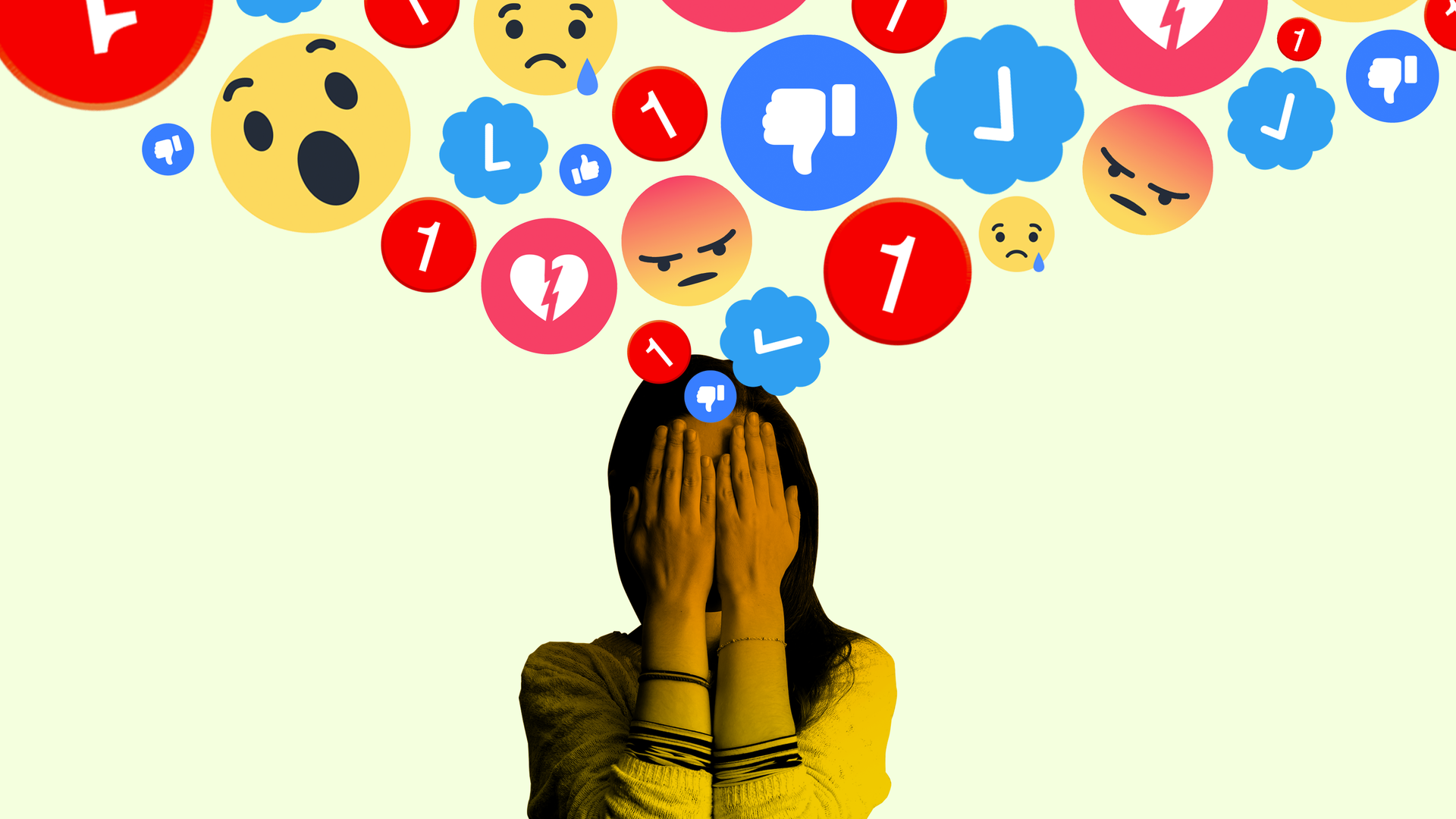| | | | | | | Presented By Salesforce | | | | Axios What's Next | | By Jennifer A. Kingson, Joann Muller and Alex Fitzpatrick · Jan 11, 2023 | | Alex here. I didn't realize how much my frequent social media use was affecting my day-to-day mood until I recently left Twitter (so long, trolls!). - As it turns out, the link between social media and mental health is becoming clearer by the day — and the news isn't great, Jennifer reports.
- How do you balance social media use and mental health? Give us a shout at whatsnext@axios.com.
Today's newsletter is 1,056 words ... 4 minutes. | | | | | | 1 big thing: Social media's mental health costs |  | | | Illustration: Lazaro Gamio/Axios | | | | Experts are increasingly warning of a connection between heavy social media use and mental health issues in children — a hot topic now driving major lawsuits against tech giants, reports Jennifer A. Kingson. Driving the news: Social scientists who study technology's effects on children say the negatives far outweigh any positives. - "There is a substantial link to depression, and that link tends to be stronger among girls," Jean Twenge, a psychology professor at San Diego State University and leading expert on the subject, tells Axios.
- "The more time the teen, particularly a teen girl, spends using social media, the more likely it is that she will be depressed," said Twenge, whose book "iGen" describes how technology has shaped Gen Z. The same is true for self-harm.
Backstory: In a landmark ruling in October, a British authority found Meta-owned Instagram culpable for the suicide of 14-year-old Molly Russell after she was exposed to self-harm content on the platform. Where it stands: Twenge and Jonathan Haidt, a social psychologist at New York University, maintain a 256-page Google doc of all published articles about social media and mental health. - It paints a picture of TikTok, Facebook, Snapchat, etc. as addictive platforms that make people unhappier the more time they spend on them.
How it works: Social media can harm children emotionally and psychologically in several ways. - Social comparison is when everybody else's life looks more glamorous online — they're invited to cooler parties or look better in a bikini (whether or not the photo has been retouched).
- Displacement occurs when kids spend so much time online that they don't get enough sleep or hang out with family and friends.
- Algorithms can prod children toward unhealthy content about eating disorders and the like.
- Pornography is reaching kids on social media at younger ages, Common Sense Media reports.
Between the lines: Specialized legal and health care practices are springing up to support children harmed by social media (and their parents). - "Most kids that encounter social media don't have adverse mental health instances, but a very, very significant percentage do," Matthew Bergman, founding attorney at Seattle's Social Media Victims Law Center, tells Axios.
Yes, but: Social media's benefits can include "connecting meaningfully with friends and family, learning a new skill, or accessing health care," per a 2021 report from U.S. Surgeon General Vivek K. Murthy (which also highlighted many of the negative effects listed above). - For LGBTQ+ youth, social platforms are important "for feeling less alone, expressing themselves, finding inspiration, and getting support."
The bottom line: Experts have proposed solutions that tech companies say they're trying to implement — such as more stringent age verification — as well as more radical ones, such as turning off children's access to social platforms at night. - Yet — as anyone who's ever been a teenager knows — it's easy enough to sidestep the controls that grownups try to place on you.
Share this story. If you or someone you know needs support now, call or text 988 or chat with someone at 988lifeline.org. En Español. |     | | | | | | 2. Diz curtails hybrid work |  | | | Disney CEO Bob Iger. Photo: Charley Gallay/Getty Images for Disney | | | | Disney employees must work from the office at least four days a week beginning March 1, CEO Bob Iger wrote in an internal memo, Axios' Nathan Bomey reports. Why it matters: Employers are trying to strike a balance between reigniting workplace ingenuity and satisfying employees' desire to work from home. - Other execs could see Iger's move as permission to take similar steps.
What they're saying: "In a creative business like ours, nothing can replace the ability to connect, observe, and create with peers that comes from being physically together, nor the opportunity to grow professionally by learning from leaders and mentors," Iger said in his memo. The big picture: Companies have had mixed success mandating a return to the office. - General Motors recently backed off a plan to bring workers back to the workplace three days a week after internal opposition, for example.
Share this story. |     | | | | | | 3. 📈 U.S. emissions rising again |  Data: Rhodium Group; Chart: Axios Visuals U.S. greenhouse gas emissions ticked up 1.3% last year after surging back from pandemic-era lows in 2021, Axios' Ben Geman writes. Why it matters: The U.S. "continues to fall behind" on its pledged 50% cut by 2030, per the Rhodium Group, a research firm. Yes, but: Unlike in 2021, last year's emissions grew more slowly than GDP — meaning the economy's "carbon intensity" fell. The big picture: The effects of last year's climate law may show up in this year's data, Rhodium said, "if the government can fast-track implementation." Go deeper: 2022 was the world's fifth-warmest year on record |     | | | | | | A message from Salesforce | | Overcoming sales challenges | | |  | | | | Sales reps are underwater in administrative work, according to Salesforce's fifth edition of the State of Sales report. Companies can help them better focus on selling by: - Automating mundane tasks.
- Streamlining communications.
- Tearing down business-slowing silos.
Read the full report. | | | | | | 4. 📸 That fire truck? It's electric |  | | | Photo: Torey Van Oot/Axios | | | | Axios Twin Cities' Torey Van Oot recently got to check out the first electric fire truck being used in the U.S. - The truck has been operating in Los Angeles for a few months, but a demo version was recently on display in Minnesota — where it's being built by fire equipment manufacturer Rosenbauer.
Why it matters: Electric fire engines can help local governments meet green energy goals. - Plus they can be cheaper to operate over the long term.
Yes, but: A single electric firetruck costs $1.6-$1.8 million — roughly double the price of the average internal combustion model. Read the rest. |     | | | | | | 5. One fun thing: So many games, so little time |  | | | A screenshot from Starfield. Image courtesy of Bethesda | | | | 2023 has the potential to be one of video gaming's biggest years in recent memory, Axios' Stephen Totilo writes. Driving the news: An abundance of major game delays over the past 12 months has set up an unprecedented cascade of impending releases. What we're watching: Electronic Arts' Dead Space remake is coming out later this month, followed by Sony's PSVR2 headset in February, Star Wars Jedi: Survivor in March, Nintendo's The Legend of Zelda: Tears of the Kingdom in May, the Xbox exclusive Starfield this summer, and more. - A handful of gaming-related TV shows and movies are also on the docket, including HBO's "The Last of Us," "The Super Mario Bros. Movie" and "Gran Turismo," based on Sony's longtime racing franchise.
💬 Alex's thought bubble: There's no way I'll have time to play even half the games I'm looking forward to this year — but here's hoping Starfield is as good as it looks. Read the rest. |     | | | | | | A message from Salesforce | | About 69% of sales professionals agree their job is harder now | | |  | | | | Sellers are adjusting to a world that is both more competitive and resource constrained amid supply chain issues and inflation. The impact: Sales professionals have shifted their strategies. Learn how sales professionals are delivering success now in Salesforce's State of Sales report. | | | | Big thanks to What's Next copy editor Amy Stern. Was this email forwarded to you? Get your daily dose of What's Next by signing up here for our free newsletter. |  | | Are you a fan of this email format? Your essential communications — to staff, clients and other stakeholders — can have the same style. Axios HQ, a powerful platform, will help you do it. | | | | | | Axios thanks our partners for supporting our newsletters.
Sponsorship has no influence on editorial content. Axios, 3100 Clarendon Blvd, Arlington VA 22201 | | | You received this email because you signed up for newsletters from Axios.
To stop receiving this newsletter, unsubscribe or manage your email preferences. | | | Was this email forwarded to you?
Sign up now to get Axios in your inbox. | | | | Follow Axios on social media:    | | | | | |










No comments:
Post a Comment